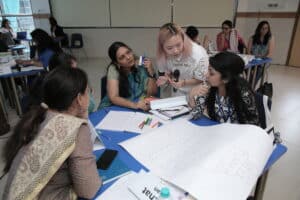
In a recent interview I conducted for the ‘Voices of the Future’ Podcast, I engaged in a fascinating conversation with Futurist Tariq Qureishy on the power of data. Using the analogy of Formula One fuel, refined approximately seventeen times, Tariq explained how data, like this “liquid gold,” can be refined to give incredible insights to organisations.
This left me pondering as an educator: what data is essential in the current shift away from exam-based education, in which so many new and emerging schools are engaged? Many of us are currently engaged in endorsing an undercurrent steering us away from traditional, exam-centric models, seeing better potential on the horizon. As we chart a new educational territory, called many things, ‘progressive education’ or ‘project-based learning,’ where challenge, skill acquisition and, in the case of THINK Global School, emotional intelligence are increasingly important compass points, this paradigm is often met with skepticism from those safely anchored in tradition. Therefore I ask, could better quality data enhance our claims?
Deciding on Essential Data
How do we keep our own course steady and demonstrate the value of our journey to others? If data is the answer, then let’s move to the next phase and decide what type of data we should be generting. With these conversations and ponderings often coming back to data, stalwarts of the traditional approach argue progressive education may risk being “data-light,” opting for subjective qualitative judgments over objectivity. In response, what is the counterclaim? Surely these growing new educational models will not abandon all data, so we are left asking again, what type of data will be needed, and what will be the source? Schools should be mindful that the data compass point is seemingly shifting to a more holistic picture of a student’s growth, that goes well beyond merely learners performance in exams.
Looking Back to Move Forward
As we carve any new path, we should not entirely be turning a blind eye to our past. We must acknowledge some part of the shadow of traditional examination, the data it created, and what value it had, and begin to master the past to either be on safe grounds to dismiss, or accommodate it in part, to our new learning paradigms. We’re not conceding to old norms but reimagining what educational success looks like – then start prototyping. In the same interview with Tariq, I said as part of our dialogue, reimagining has been exhausted, let’s now look to bravely redesign.
Growth measures beyond exams is a tricky conundrum – which is why the change has been so hard. But fear not, data is everywhere. The challenge lies in devising a system that doesn’t transform into another cutthroat race for the highest grade, best-looking portfolio or who can collect the most skills. Progress shouldn’t be a competitive sprint but a collaborative marathon (I often in my time as Principal looked to the proverb, “If you want to go fast, go alone, if you want to go far, go together”). Which is why we need to be careful with the insights drawn from vast amounts of data possibly collected.
A Brave New World
When considering evaluating skills that traditional models often overlook: collaboration, resilience, empathy, and problem-solving capabilities. At the Think Learning Studio, we continue to work on, and explore tools like portfolios, self-assessments, and teacher narratives that can paint a comprehensive picture of student growth if used correctly (see our Odyssey course).
Such models, as the Montessori, Waldorf, and our own THINK Global movement, project-based learning schools offer (we hope) captivating new views of educational success, each with its focus on creativity, critical thinking, and emotional growth. Yet, as every seasoned navigator knows, “beautiful islands often hide treacherous reefs”. We need to navigate around risk effectively, adopting models with sufficient understanding behind them, and data, as Blake Boles says in the wonderful book “Why Are You Still Sending Your Kids to School?” – the data is light on the power of Project Based Learning, as it is for alternative pathways to degrees – but that doesn’t mean it’s not there.
Stanford University’s Center for Education Policy found in 2007, that PBL students outperformed their counterparts who received traditional instruction, especially in their ability to apply their knowledge to real-world problems (Hmelo-Silver, Duncan, & Chinn, 2007). In addition, Purdue University found that PBL students tend to demonstrate better long-term retention of material, greater problem-solving and collaboration skills, and a deeper understanding of the subject matter (Walker & Leary, 2009). Finally, a study published in the Journal of School Psychology (Lillard, 2012) reported that Montessori students performed better than their traditional school peers, both academically and socially.
Charting the Course
Yes, the journey towards progressive education can be turbulent and not leaving the safety of teacher-led education in a format that pleases administrators and inspectors is tempting, but I can confidently say that after our own THINK Global School journey – the choppy seas are worth the navigation. Now, if we also take the next step in embracing quality data, we can foster deeper discussions on bringing along for the ride, more traditional accreditation organisations and ministries, help others avoid the pitfalls, and draw inspiration from successful alternative models that act more as a collective than silos.
In what Huxley calls a brave new world, we can imagine an education model that is not a mere transmission of knowledge, but a means to shape individuals’ as we see echoes of Huxley’s vision, not falling back into dystopian undertones of an emotionally crippling rat race, but in the concept of education being the fundamental instrument of personal and societal growth.
Armed with better data, we’re not just navigating education; we’re charting course for a more comprehensive future vision of who we are.

TLS Course in Action
Ideas for richer data:
- Portfolios: A student’s portfolio is a collection of their work and accomplishments over a period. It can include projects, assignments, self-assessments, and even reflections on their learning journey. It offers a comprehensive view of their progress and skills.
- Peer and Self-assessments: These can provide insightful data about a student’s understanding and emotional intelligence. Self-assessment fosters self-awareness and self-regulation, while peer assessment encourages critical thinking and empathy.
- Performance-Based Assessments: This method requires students to perform a task rather than answer questions. For instance, a science student might be asked to carry out an experiment while a music student could be asked to perform a piece.
- Learning Analytics Tools: Several software tools provide real-time data about students’ progress and engagement with learning materials. It can track their pace of learning, the resources they use, and the challenges they face. Headrush has been a great tool for us at THINK Global School.
- Capstone Projects: In these culminating projects, students apply all they’ve learned in a course or grade level to a comprehensive project. These can be evaluated on several dimensions providing rich data. We actually do both at TGS, a Capstone Project and a Mastery Project.
_______
- Hmelo-Silver, C. E., Duncan, R. G., & Chinn, C. A. (2007). Scaffolding and achievement in problem-based and inquiry learning: A response to Kirschner, Sweller, and Clark (2006). Educational Psychologist, 42(2), 99-107.
- Walker, A., & Leary, H. (2009). A problem-based learning meta-analysis: Differences across problem types, implementation types, disciplines, and assessment levels. Interdisciplinary Journal of Problem-Based Learning, 3(1), 12.
- Lillard, A. S. (2012). Preschool children’s development in classic Montessori, supplemented Montessori, and conventional programs. Journal of School Psychology, 50(3), 379-401.










